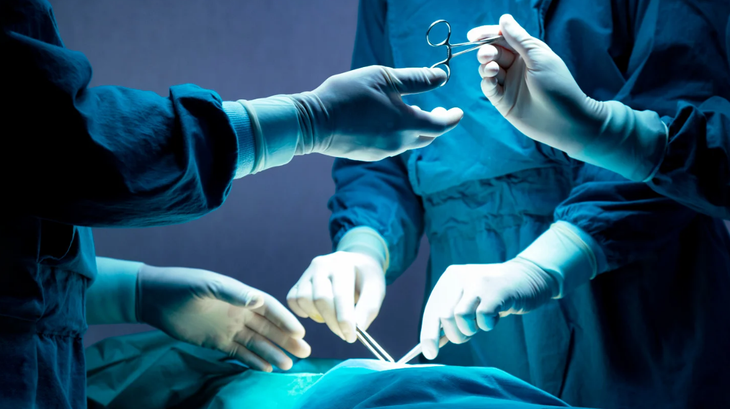
Repairing wounds in organs such as the lungs, arteries, or heart is always a major challenge in clinical medicine due to their constantly expanding, moist, and vulnerable properties - Photo: AI
According to Medical Xpress, scientists from the University of California, Los Angeles (UCLA) and the University of California, San Diego (UCSD) have developed a new bioadhesive called MeTro/SN, which combines methacryloyl-modified recombinant tropoelastin (MeTro), a highly bioelastic protein, with Laponite silicate nanosheets (SNs) that have the ability to enhance hemostasis and adhesive strength.
Repairing wounds in organs such as the lungs, arteries, or heart has always been a major challenge in clinical medicine due to their constantly expanding, moist, and vulnerable properties. Traditional suturing methods using thread, staples, or metal are not only difficult to perform in moving tissue conditions, but can also lead to prolonged bleeding, fluid leakage, or local inflammatory reactions.
Current tissue adhesives, although capable of adhesion, often stiffen tissue, affect natural elasticity, and can even cause cytotoxicity or immune reactions.
MeTro provides softness and elasticity, while SNs help increase adhesion and accelerate clotting. When combined, the mixture forms a hydrogel that can be injected directly onto damaged tissue to seal it in seconds.
In a series of preclinical tests, MeTro/SN showed remarkable effectiveness in mouse and pig models. On pig lung tissue, the adhesion force of MeTro/SN reached 23 kPa, nearly double that of pure MeTro (12 kPa). The pressure resistance of the hydrogel on arterial tissue was up to 3.6 kPa, surpassing many commercial bioadhesive products today.
On beating heart tissue, MeTro/SN maintained adhesion at 47 kPa, confirming its leak-proof ability in the continuous heart environment.
In particular, in the mouse tail amputation model, the patch reduced blood loss by 99% compared to the untreated group and by 91% compared to MeTro alone. Clotting time was also shortened from 15 minutes to 12 minutes with only 1% SN content in the hydrogel.
Biosafety is a prominent advantage of MeTro/SN. Histological analysis at 7 and 28 days after treatment showed no inflammation, fibrosis or tissue necrosis. There was no hemolysis or cell damage, indicating that the product is highly biocompatible and does not cause significant immune reactions.
One of the notable trials was the use of MeTro/SN in the treatment of porcine lung injuries. The results showed that the hydrogel maintained its adhesion and completely prevented leakage for 14 days, even under physiological lung tissue pressure conditions. No peeling or damage to surrounding tissue was observed. This is extremely important when applied in real surgery.
Researchers believe that with its ability to stop bleeding quickly, strong adhesion, good elasticity, and high biosafety, MeTro/SN hydrogel can completely become an effective alternative to current sutures and tissue adhesives, especially in trauma emergencies, cardiovascular surgery, organ transplantation, and other emergency medical situations.
Source: https://tuoitre.vn/mieng-dan-sinh-hoc-giup-cam-mau-dan-kin-mo-chi-trong-vai-giay-20250517210539856.htm



















































![[Maritime News] More than 80% of global container shipping capacity is in the hands of MSC and major shipping alliances](https://vphoto.vietnam.vn/thumb/402x226/vietnam/resource/IMAGE/2025/7/16/6b4d586c984b4cbf8c5680352b9eaeb0)













































Comment (0)